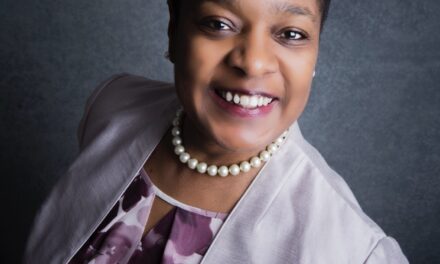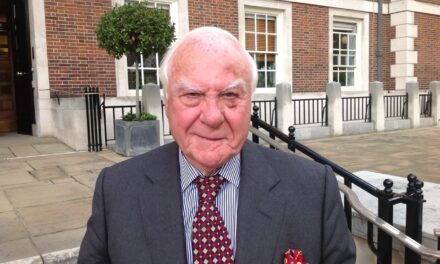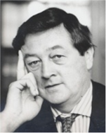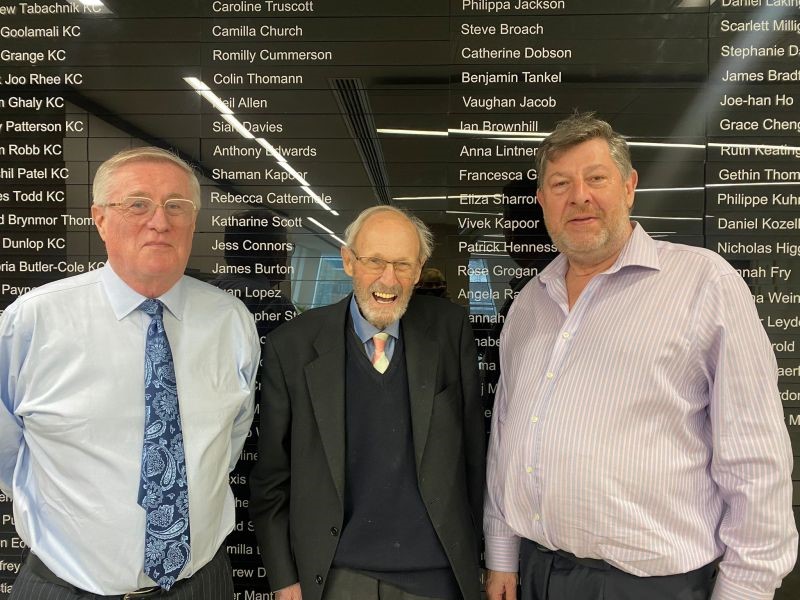
Paul came officially into my life on Monday 23 July 1984, when, on arriving at 22 Old Buildings, Lincoln’s Inn, he was told that his pupil master was not coming in that day, and he would have to amuse himself.
For 40 years we remembered that day, the day my daughter Claudia was born and the first day of his pupillage. In her he always took an interest.
There was no paternity leave then, so I was in the next day and thus began a relationship of 40 years, one week and two days.
Handlers of racehorses always like to say that they knew that this year’s Derby winner would be a champion from the first day they saw him. I didn’t. I should have.
He arrived at my stables as thin as a garden hose, loud, friendly, keen to learn and as restrained as a stayer on the first circuit.
His record of influencing the great had already begun with Lord Diplock.
Paul was President of the Middle Temple Students’ Association (MTSA) and he wanted a fitting memorial to a great teacher and mentor to students, Master Hubert Monroe; the 1981 Hamlyn lecturer and reviver of Revels, who could make 9am tax lectures come alive.
Paul lobbied the Under Treasurer who was resistant and bureaucratic.
Master Diplock was subject to the Darling treatment. Contrary to the Under Treasurer’s wishes, the Monroe proposal found its way onto Parliament’s agenda and the Under Treasurer spoke against it.
Then Master Diplock got up. He said that this was ‘the initiative of the students’, that Monroe was a ‘gifted teacher of the students’, there could be no ‘better memorial to such a great teacher than the memorial proposed by the students’ and that Parliament should approve and fund the ‘proposal of the students.’ At each mention of ‘students’, Master Diplock, a man noted for great jurisprudence, but not perhaps passion, rapped the table.
My source was Jean Austin, Christa Richmond’s (the Inn’s Director of Education) predecessor but one. She told me this before Paul arrived as my pupil, so I was prepared. By ‘the students’, Diplock meant Paul. It was the 1980s so nothing went viral. But this was as close as it got. It was clear that Paul’s influence upon that great jurisprudence was immense and a force for good.
This was the first of many examples of his ability to direct events. As Head of the Technology & Construction Bar Association (TECBAR), he worked in partnership with Master Igor Judge to reform the Technology and Construction Court (TCC) and turn it from a failing court to one which is internationally respected. That saga would fill a novel. That achievement alone would satisfy many as a life well lived.
However, in July 1984, the reform of the TCC was in the future.
The competition for the single space at 22 Old Buildings was severe. It is fair to say that Paul’s potential was not fully evident, restrained as his character was by that ghastly devourer of confidence – pupillage. He went to Donald Keating’s Chambers and prospered.
On arriving at Donald’s set, for me all went quiet from Paul. Until I was led by John Blackburn KC (the late and much missed Master Blackburn, Master Dyson’s best opponent) in an arbitration all about the GMEX centre in Manchester. It involved difficult expert evidence, which Master Blackburn and I thought we had understood. Paul was the opposing junior, led by one of the best.
We were a little surprised when we were told, on the evening before our expert was to give evidence, that Mr Darling would be cross examining.
John and I felt a little sorry for Paul. This was a good expert who would destroy their case. It reminded me of the chapter in a Trollope novel where Mr Furnival KC has his inexperienced junior cross examine an unbreakable witness so the jury would feel sorry for the junior and set aside the unbroken evidence.
John Blackburn and I suffered relentless forensic torture; the only comfort being that Paul’s leader looked as stunned as we felt. As we contemplated the rubble of our case in the break-out room, John eyed me with his knowing glint and said, ‘what a mistake we made.’
As Julia Roberts said in Pretty Woman, ‘Big Mistake. Huge.’
It’s fair to say that there must have been many such moments for others along the way of his remarkable career, since his sociability masked his ability. It could lead to the assumption that he was lucky in picking up crucial documents at the top of the pile. The truth was prosaic. He worked hard.
Frances Gibb’s admirable obituary in The Times started with a story of John Marrin as arbitrator expressing surprise at the finding of a document which was responsible for the downfall of another expert witness. Gibbs’ source was not John Marrin, who was only teasing and knew better. Neither was it his junior, who tells the full tale. He and Paul were holed up in a Dubai hotel prepping the case with only a few trips out to Meydan racecourse for light relief. The killer document was found by Paul and not his junior, who is renowned for attention to detail. He remembers to this day the bundle number. It was K55. He had not spotted it. Paul had. To those who ascribed his success to luck; remember K55.
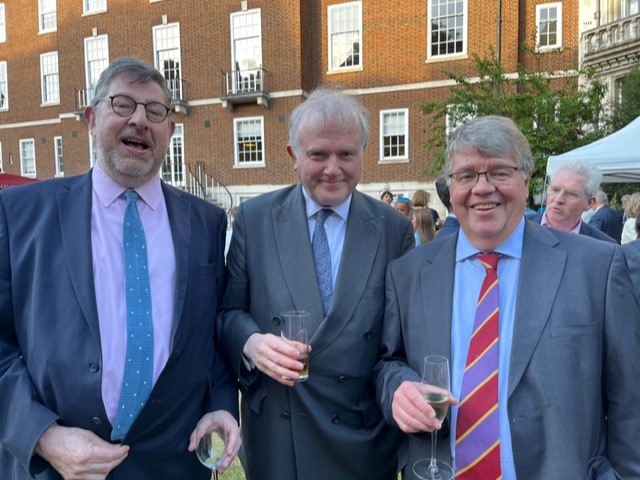
We became good friends; sharing confidences which never leaked – gossip as he was.
He wore his heart on his sleeve. If people were unkind, he felt it and deeply. And it affected him. The relief when such things resolved was overwhelming and palpable.
His connection with people was what made his sudden departure so shocking to so many. This was not skin-deep gadfly stuff. It was affinity with people at every level. He understood who they were because he was interested and cared. His insecurity was as big as his voice was loud. But this insecurity was key. It gave him an understanding heart.
So, when a new security guard arrived at chambers one Christmas, Paul not only greeted him by name, but he also gave him a small but significant Christmas present.
So, when a friend had a medical emergency, her bills were paid.
Those who experienced his kindnesses spread far and wide. So many have debts to that kindness, be they celebrities in horseracing or the security guard in the legal world. In that same legal world, his abiding passion was the support and promotion of the young Bar, particularly those who did not have the social advantages he had. His generosity, financially and with his time, gave them the confidence to succeed.
He loved horses and horseracing and recounting his early trips to racecourses with his parents and much beloved brother, Ian.
His contribution to the sport was immense and would take up an obituary of its own. At its root was a love of horses and people. This love was energetically pursued to the good, with strategic thought.
You could be forgiven upon meeting him that he was all affability. The TCC reform says otherwise. The world of sport knows likewise. I remember, as yesterday, meeting someone, on the way to see him, telling me that he was about to go into ‘the Headmaster’s Study’.
Paul was devoted to Ian (now a much-respected judge) and his five nephews and nieces. Their loss is huge.
His mother was formidable. There is a photograph of her with Queen Elizabeth II opening a court complex in Newcastle. One can imagine, in looking at it, even that great monarch having in mind the need to toe Mrs Darling’s line.
His father was a reforming pharmacist of huge influence.
They were hard acts to follow, and he knew it.
He repaid his parents, whose deaths left a huge gap, by reviving Darlings Pharmacy (est. 1905) which had slid a little by the time they died. This involved not just money and vision, but also attention to detail of the K55 kind. Recently overheard, by a pupil sharing his room, is this side of a telephone conversation: ‘Yes, but Mrs Jones must have her prescription now.’ The continuation of that name would be a legacy sufficient for most. But for him it was just one.
For a man of such restless nature, personal life was not easy. Settled peace took its long time. It came with Camilla, with whom he found lasting happiness. He was devoted to her and she to him. If you got him on her work for the Kalisher Trust, he would wax lyrical with admiration.
Camilla’s parents, The Rt Hon Anne Rafferty DBE (former Lady Justice of Appeal) and Master Brian Barker (former Recorder of London) gave him support which he cherished. Their love for, and devotion to, him was palpable. The gap he leaves for Camilla, Anne and Brian is fathomless.
It could not last. We were lucky to enjoy his life as it boomed its way through our consciousness.
Obituary written by Master Richard Wilmot-Smith

